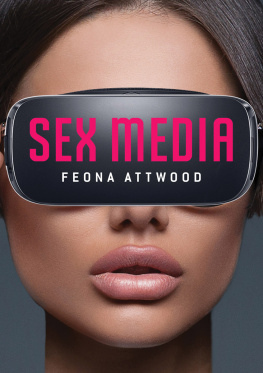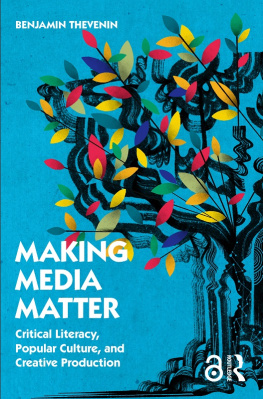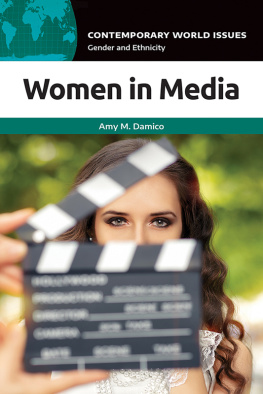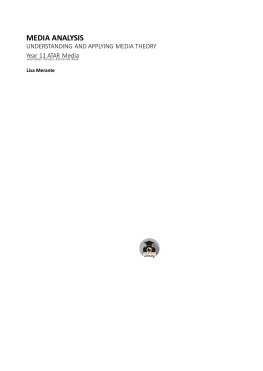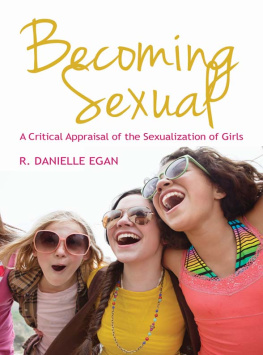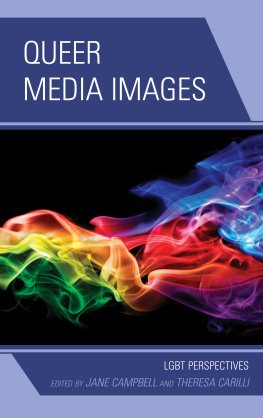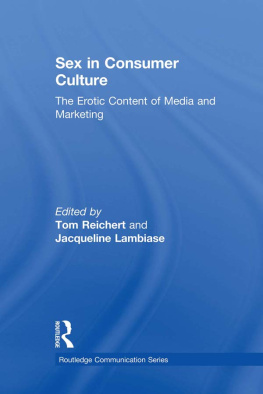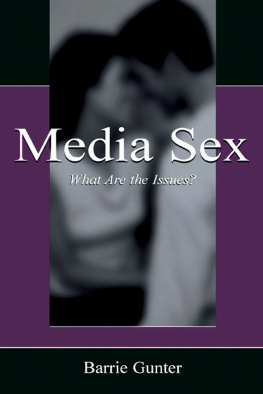Contents
Guide
Pages

Sex Media
Feona Attwood
polity
Copyright Feona Attwood 2018
The right of Feona Attwood to be identified as Author of this Work has been asserted in accordance with the UK Copyright, Designs and Patents Act 1988.
First published in 2018 by Polity Press
Polity Press
65 Bridge Street
Cambridge CB2 1UR, UK
Polity Press
101 Station Landing, Suite 300
Medford, MA 02155, USA
All rights reserved. Except for the quotation of short passages for the purpose of criticism and review, no part of this publication may be reproduced, stored in a retrieval system or transmitted, in any form or by any means, electronic, mechanical, photocopying, recording or otherwise, without the prior permission of the publisher.
ISBN-13: 978-1-5095-1691-9
A catalogue record for this book is available from the British Library.
Library of Congress Cataloging-in-Publication Data
Names: Attwood, Feona, author.
Title: Sex media / Feona Attwood.
Description: Malden, MA : Polity Press, [2017] | Includes bibliographical references and index.
Identifiers: LCCN 2017013930 (print) | LCCN 2017029093 (ebook) | ISBN 9781509516902 (Mobi) | ISBN 9781509516919 (Epub) | ISBN 9781509516872 (hardback) | ISBN 9781509516889 (paperback)
Subjects: LCSH: Pornography--Social aspects. | Pornography in popular culture.
Classification: LCC HQ471 (ebook) | LCC HQ471 .A88 2017 (print) | DDC 306.77--dc23
LC record available at https://lccn.loc.gov/2017013930
The publisher has used its best endeavours to ensure that the URLs for external websites referred to in this book are correct and active at the time of going to press. However, the publisher has no responsibility for the websites and can make no guarantee that a site will remain live or that the content is or will remain appropriate.
Every effort has been made to trace all copyright holders, but if any have been inadvertently overlooked the publisher will be pleased to include any necessary credits in any subsequent reprint or edition.
For further information on Polity, visit our website: politybooks.com
Acknowledgements
Thanks to all at Polity for making the process of completing this book so pleasant and straightforward Elen Griffiths, Ellen MacDonald-Kramer and Mary Savigar and to Tim Clark for copy-editing.
I would not have been able to write the book at all without the many inspiring scholars working in gender and sexuality and media and cultural studies especially Kath Albury, Martin Barker, Meg John Barker, R. Danielle Egan, Alan McKee, John Mercer, Susanna Paasonen, Julian Petley and Clarissa Smith whose work I repeatedly return to.
Big thanks to Julian, Meg John, Danielle and Clarissa who read individual chapters early on in the process and helped me to work out whether I was on the right track. Thanks to the Wellcome Trust for funding a small project on sexualization and public engagement and to all the academics who contributed to The Sexualization Report (Attwood et al., 2013) and other experiments in making academic work more accessible. For inspiration in this area, thanks in particular to Meg John Barker, Justin Hancock, Petra Boynton and Clare Harris.
Introduction
Sex sells. Our world has been pornified. Culture is sexualized and its making our children grow up too quickly. Porn is everywhere. Porn changes your brain. There is an epidemic of porn addiction. Porn is a public health crisis. Sexting is a growing problem. Raunch culture is damaging girls. Virtual reality is the future of porn. The future of sex is with robots.
These kinds of sensationalist claims are made repeatedly in the public discussion of sex media. While sex media are part of many peoples lives, they are increasingly used as a focus for discussing a range of other questions what access we should have to the internet, what it means to be sexually healthy, how men and women differ in their relation to erotic and intimate life, what the relations between media, fantasy and sexual practice are.
This book is about sex media those media forms in which sex is the primary focus of representation. As studies of pornography and other sexually explicit media have shown, sex media are diverse, interesting in and of themselves, and worthy of study. They allow us to consider how media are increasingly part of public and private life; part of peoples practices and their sex lives. They can help us to think about the changing place and significance of sex in contemporary society.
My argument in this book is that we need better and more critical frameworks and approaches for understanding sex media. While being critical is often associated with being condemnatory or pessimistic about something, critical thinking does its best to avoid a binary approach which sets up a debate in terms of whether we should be pessimistic or optimistic about it, or which asks us to decide definitively whether something is good or bad, healthy or unhealthy, progressive or oppressive.
A critical approach to sex media questions assumptions about the way things are or appear to be, draws on insights from disciplines that acknowledge the complexity of culture, and takes into account the shifts and continuities in the ways that sex and media are constructed historically. It understands that research is framed by asking particular kinds of questions, and recognizes that both advantages and problems arise from doing things in particular kinds of ways. It considers the contexts of sex media their relation to other media genres, forms and aesthetics and to the broader social and cultural frameworks of regulation, work, leisure, intimacy, health and education.
I have not been able to cover everything that I would have liked to in this book. The book is also focused primarily on examples, histories and debates from English-speaking countries, and the arguments I make about these do not necessarily apply to other countries. For example, while I have spent quite a bit of time talking about the ways in which pornography has been an important issue for feminists, this has played out in quite different ways in different countries.
The book begins with an overview of what is meant by sex, gender and sexuality, moves on to questions of regulation and the issue of sexualization, and then considers a range of sex media and their relation to labour, leisure, education and health.
introduces the terms sex, sexuality and gender, and shows how definitions and representations of these often depend on a hierarchy that marks out good and bad and presents sexuality and gender as binary where there are only two ways of being: heterosexual or homosexual, male or female, masculine or feminine.
While definitions and representations can work to restrict and police the way sex and gender are understood, they can also be used to challenge norms and create new types of experience, community and ways of thinking. I describe how sexual politics that attempt this have developed since the 1960s, and how countercultures and political activists have worked to shape these politics. I also show how critical approaches in lesbian and gay studies, queer theory, sexuality and gender studies have provided frameworks for understanding sex and sexuality.
The chapter ends with a look at how some contemporary forms of sex advice often privilege certain kinds of practices and identities, while others suggest a move towards different ways of thinking about sex. This is happening in a context where both sex and the media are increasingly central to our culture and a range of technologies play an increasingly important role in our experiences and understandings of sex.

